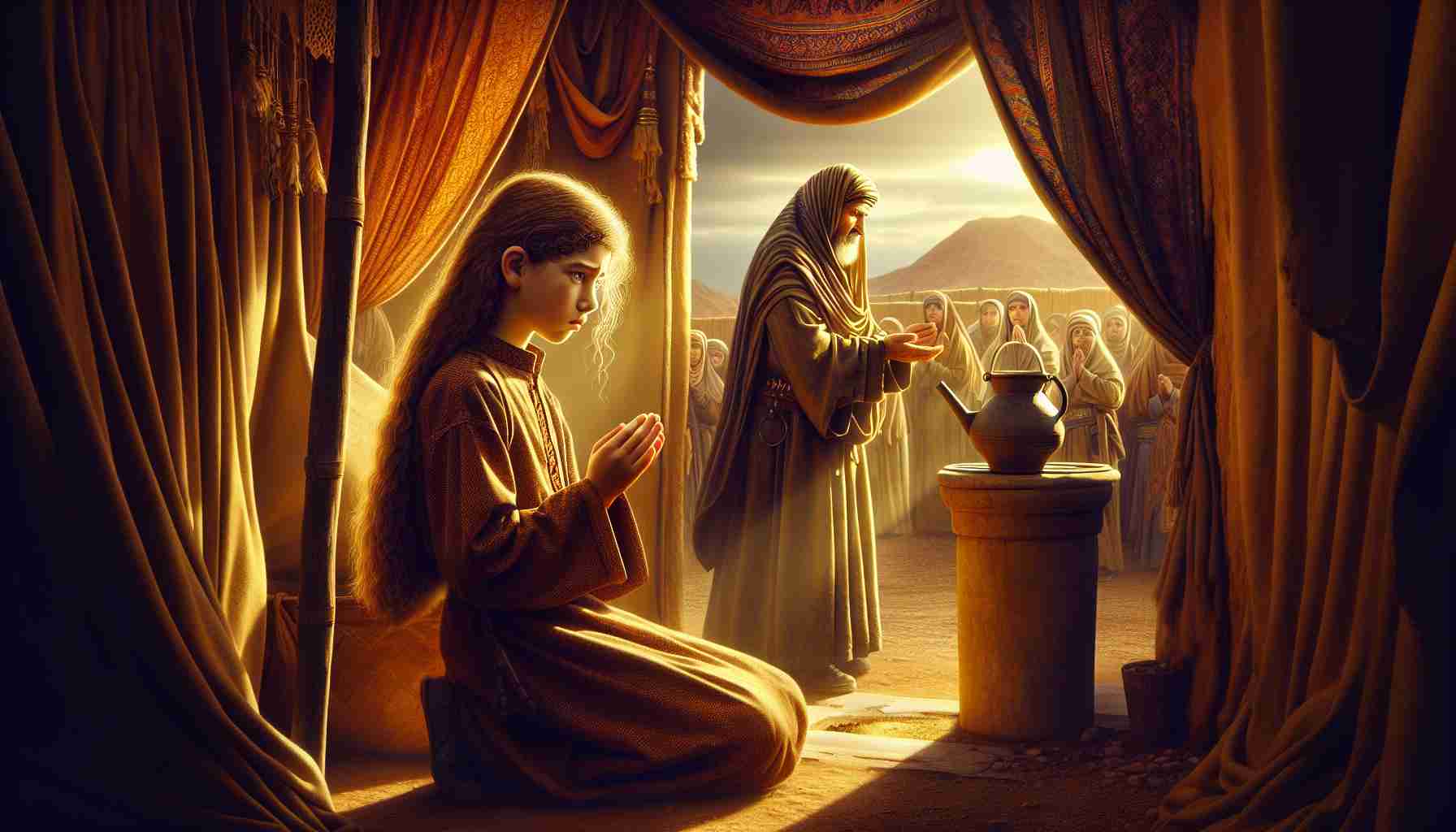

I was just a girl from Ramah, the daughter of a cloth-dyer. My father’s stall stood near the gates of Shiloh, not far from the Mishkan—the holy place where the ark of Hashem rested. I wasn’t anyone important, but I remember the day Chana came to pray. I remember it like it was stitched into my heart.
The day was hot, and I had gone to fetch water when I saw her. A woman dressed in simple but fine clothing, kneeling near the entrance of the Mishkan. She wasn't saying anything—at least not out loud. Her lips moved, but no sound came out.
At first, I just stood there, tilting the water jug in my hands. I had never seen someone pray like that—so full of pain and hope at the same time. It was like her whole body was crying, even though no tears fell.
Then Eli—the Kohen Gadol, the high priest—walked up to her. He frowned. “How long will you be drunk?” he asked sharply. “Put away your wine!”
I gasped. I could see her shoulders stiffen. But Chana didn’t yell or walk away. Her voice was soft, but I could hear her now. She said, “No, my master. I am a woman with a bitter soul. I haven’t drunk wine or strong drink. I’ve only been pouring out my heart before Hashem.”
Eli blinked, surprised. I think he realized then what I had sensed too: this wasn’t a woman out of control. This was a woman in control of something much harder—her faith.
Eli said, “Go in peace. May the God of Yisrael grant your request.”
Something changed after that. Her face, which had been full of sorrow, now held something else—hope. She stood up, wiped her eyes, and left.
Months passed. I turned twelve. I learned to weave patterns into wool. I didn’t see Chana again for a long while.
But then one morning, there she was! Her face glowed as she held a small boy’s hand. He was about three years old, with big eyes and gentle curls. I heard her speak to Eli, “For this child I prayed, and Hashem gave me what I asked. Now I am giving him to Hashem as long as he lives.”
I watched her let go of his hand—offering him to the service of Hashem. He didn’t cry. Neither did she. That boy was Shmuel—the prophet Samuel. The one who would grow up in the Mishkan, who would hear Hashem’s voice when others could not.
Chana came back every year. Each time she brought him a new coat, a little bigger than the last.
She had been barren. She had been mocked. But she didn’t grow bitter. She grew stronger.
When people whisper about miracles, they usually speak of fire from the sky or seas that open.
But I saw one born from a mother’s quiet prayer.
And that miracle changed our people forever.
I was just a girl from Ramah, the daughter of a cloth-dyer. My father’s stall stood near the gates of Shiloh, not far from the Mishkan—the holy place where the ark of Hashem rested. I wasn’t anyone important, but I remember the day Chana came to pray. I remember it like it was stitched into my heart.
The day was hot, and I had gone to fetch water when I saw her. A woman dressed in simple but fine clothing, kneeling near the entrance of the Mishkan. She wasn't saying anything—at least not out loud. Her lips moved, but no sound came out.
At first, I just stood there, tilting the water jug in my hands. I had never seen someone pray like that—so full of pain and hope at the same time. It was like her whole body was crying, even though no tears fell.
Then Eli—the Kohen Gadol, the high priest—walked up to her. He frowned. “How long will you be drunk?” he asked sharply. “Put away your wine!”
I gasped. I could see her shoulders stiffen. But Chana didn’t yell or walk away. Her voice was soft, but I could hear her now. She said, “No, my master. I am a woman with a bitter soul. I haven’t drunk wine or strong drink. I’ve only been pouring out my heart before Hashem.”
Eli blinked, surprised. I think he realized then what I had sensed too: this wasn’t a woman out of control. This was a woman in control of something much harder—her faith.
Eli said, “Go in peace. May the God of Yisrael grant your request.”
Something changed after that. Her face, which had been full of sorrow, now held something else—hope. She stood up, wiped her eyes, and left.
Months passed. I turned twelve. I learned to weave patterns into wool. I didn’t see Chana again for a long while.
But then one morning, there she was! Her face glowed as she held a small boy’s hand. He was about three years old, with big eyes and gentle curls. I heard her speak to Eli, “For this child I prayed, and Hashem gave me what I asked. Now I am giving him to Hashem as long as he lives.”
I watched her let go of his hand—offering him to the service of Hashem. He didn’t cry. Neither did she. That boy was Shmuel—the prophet Samuel. The one who would grow up in the Mishkan, who would hear Hashem’s voice when others could not.
Chana came back every year. Each time she brought him a new coat, a little bigger than the last.
She had been barren. She had been mocked. But she didn’t grow bitter. She grew stronger.
When people whisper about miracles, they usually speak of fire from the sky or seas that open.
But I saw one born from a mother’s quiet prayer.
And that miracle changed our people forever.